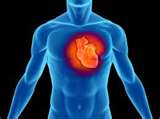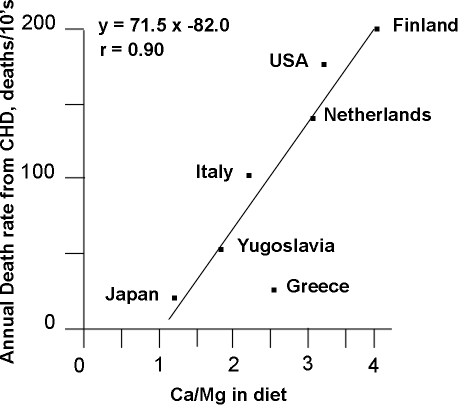There is a connection of calcium to cardiovascular artery health. ref But it is not always easy to comprehend. Calcium can get deposited in plaque build up inside artery walls. And to complicate this situation, the amount of calcium in artery walls is not directly related to calcium consumption amounts. Both low or high calcium intake levels can be associated as well as any in-between level.  Very high, over 1500mg, becomes more unstable for body to regulate. Thus, there must be another factor or two that determines this artery calcium plaque build up process. Vitamins K2 and D, plus the ratio of calcium to magnesium and phosphorous. Potassium is vital too.*
Very high, over 1500mg, becomes more unstable for body to regulate. Thus, there must be another factor or two that determines this artery calcium plaque build up process. Vitamins K2 and D, plus the ratio of calcium to magnesium and phosphorous. Potassium is vital too.*
Consuming calcium by itself may not be wise without knowing magnesium and phosphorous intakes. Yes, of course the body has some remarkable abilities to compensate for higher calcium intakes but this becomes less efficient if chronic excess calcium is consumed over a long time.
The chart here may just represent an association of calcium magnesium ratios to heart disease, but there could very well be a physiological basis for it. Only Greece with the heart healthy Mediterranean diet escapes this almost linear progression. The evidence is building - ref

The FDA and the AMA have only recently acknowledged that measuring the calcification extent of arteries is a risk factor for potential heart disease. In fact, it may actually be more reliable than cholesterol levels.
Coffee has some interesting benefits. It appears the more you drink, the lower your risk of heart disease. It could be the 70 mg of magnesium per cup helps offset the high calcium in the American diet plus coffee also has many antioxidants to help lower inflammatory factors, all participants of importance for artery health. ref ref
In this article, a Science-Based Medicine Health Professional describes his two year evaulation and analysis of studies on calcium's influence of the cardiovascular disease rate.
Here is the conclusion from a coffee study, "In conclusion, caffeinated (and decaf from other studies) coffee consumption was associated with lower risk of CHD mortality and heart valve disease development or progression in older Framingham subjects without moderate or severe hypertension."
Of INTEREST: Here is one result from a large review of many studies on the influence of calcium on heart disease. "Calcium supplement consumption was associated with more heart attacks, but not strokes or overall cardiovascular death. The observed rise in heart attack risk was substantial and statistically significant (hazard ratio of 1.86, confidence interval of 1.17-2.96). This elevated risk was even higher in calcium-only supplementers, where a 2.39x elevated risk was observed (confidence intervals 1.12-5.12). There also appears to be a relationship between bone loss and artery calcification. As bones reduce density, arteries exhibit increased calcification. Check out this ref.
The calcium only group would increase the ratio of calcium to magnesium which according to the chart above, increases risk just like the report found.
VITAL: Dr Martha Payne analyzed brain lesions in Seniors to see if there were any associations with nutrient intakes. She found verified by MRIs that only two nutrients were associated positively with greater size and number of brain lesions, Calcium and Vitamin D. Brain lesions show up as abnormal dark or light spots on MRIs and CT scans. ref They might form as the result of head trauma, or from abnormal internal events like strokes. A certain amount might just be due to ageing of the vascular system. ref
Just like in arteries, cholesterol and calcium may build up as a protective mechanism employed by the body to help support damaged and weakened blood vessel walls so they will not rupture. Vitamin D may be guilty because it helps absorption of calcium and impact of calcium placement in body by osteocalcin generation. Osteocalcin is a protein that needs vitamin K to become activated so it can participate in binding calcium into bone. Without enough vitamin K for activation, not only will calcium not be directed to bones, but another vitamin K activated protein, MatrixGLA, will not keep calcium out of arteries. ref It could be this mechanism that Dr Payne really found for the Calcium association with greater amount of brain lesions. Here is first 2008 research ref and here is 2nd recent 2014 study ref These are very significant studies that need continued and immediate verification to validate safety of calcium supplements for Seniors, or at least the vitamin K2 connection to limit calcium going into soft tissues. ref Seniors may not convert enough vitamin K1 into K2 at adequate amounts to satisfy needs.
On Dementia: Reference that follows shows another recent study with an association between increased calcium supplements and dementia in women who have suffered strokes or show stroke brain damage on CT or MRI scans. ref
Here is result of study: When women had white matter lesions that can be a precursor to strokes, the dementia risk was three times greater when they took calcium supplements. Dr Payne's work above adds strength to this recent study.
*Potassium at adequate levels is protective of bone calcium remaining in bones. Plus it helps regulate nerve impulses and thus body communication signals, many of which involve calcium.
